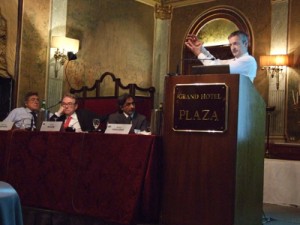Theme :
Place : ,
Date : On 11 march 2011
Mediterranean partners reflect on their development model
At their annual conference, members of the Euro-Mediterranean Forum of Economic Institutes (FEMISE) raised the future of Mediterranean economies, which are being wooed by Europe and the world’s major powers.
Can Mediterranean countries avoid the cost of major structural change, plus a veritable industrial policy? This was the question put to members of FEMISE, during the FEMISE annual conference held in Rome on 24-25 November 2010. For Mustapha Nabli, vice-president of the World Bank and responsible for economic development, one need only observe the most recent examples of development of emerging countries to conclude that they can. From Malaysia to Korea, not to mention China, Asian development has been based on sound economic decisions. “The type of partnership proposed by Europe has not produced significant effects in Mediterranean countries”, retorts Mustapha Nabli. “States should not focus their efforts on growth; rather, there should be investment in industry and support given to the efforts of the private sector to compensate for failures in new markets and help businesses work better”. Thus, Mustapha Nabli is convinced that MENA countries should continue with their efforts, drawing on successful examples.
By way of illustration, the president of the Science and Technology Policy Institute (STPI),Suk Joon Kim, highlighted the strategy that enabled South Korea to achieve its current level of development. “Korean GDP has seen uninterrupted growth since the 1960s”, says Suk Joon Kim. “My country pays very close attention to international trade, and it was in this area that it found its first keys to its development. Over time, we have moved from heavy industry into high-tech”, he explains. “Since then, we have been committed to green growth with ambitious short-term objectives”.
While it has been able to balance its economy, Turkey must still resolve some major problems: “Our GDP per capita has hardly changed since the 1980s”, laments Esen Caglarfrom the Economic Policy Research Foundation of Turkey (TEPAV). “Moreover, our SME are not developing in a satisfactory manner. Unemployment remains very high, while at the same time brain drain is depriving us of essential skills”.
What tools, then, could be used to develop the economies of the Mediterranean? Simon Neaime of the American University of Beirut suggests action on the monetary policy front, a course of action that enabled Egypt to weather the crisis. Jean-Louis Reiffers, for his part, recalls that governments always play a role in great economic success stories. “It is no longer a question of choosing between openness and industrial policy, says the president of the FEMISE scientific committee. “The future lies in the development of public-private partnerships (PPP). At the same time, solutions must be studied in terms of financial policies and labour productivity”.
Representing the European Commission, Pierre Deusy praises the development model proposed by Europe for countries in the South: “The model goes beyond economic measures to put in place a global model for society”, he says. “This societal convergence, which is restrictive for countries in the South, is the basis of our partnership”.
Available Presentation to download:
Mustapha K. Nabli: New Thinking on Structural Transformation, Diversification and Industrial Policy, and the Euro- Med Partnership
Suk Joon KIM: Korean Industrial Policy and the Role of Science and Technology (PPT File)
Esen Caglar: Structural transformation in Turkey: With or without industrial policy?
Simon Neaime: Implications of the Global Financial Crisis on MPCs
Mohamed Chafiki: Un Maroc en devenir: des transformations et une ambition arrimée aux changements du monde
Khalid Sekkat: Industrial Policy: The Experience of Developed Countries (PPT File)
Michael Gasiorek: Crisis and Recovery Measures: Trade and the Med countries
Possible answers to these decisive questions for the future of the Mediterranean are studied in the latest FEMISE report, “The crisis and ways out of it in the FEMIP Mediterranean partner countries”.



